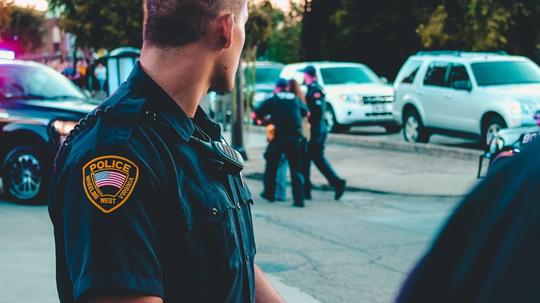
A woman with a cognitive disability was lost. A man with mental disorders felt suicidal. They both encountered law enforcement. Their interactions could have been full of misunderstandings – or worse. Instead, the Vitals team shares them as success stories.
The Vitals App – built to prevent situations between vulnerable people and first responders from escalating – was created in partnership with the Autism Society of Minnesota. Members of the startup’s founding team learned while volunteering with the organization that interactions with first responders topped the list of concerns among those working with or caring for people affected by autism.
Vitals has about 1,800 individual users and nearly 60 first responder agencies on board in Minnesota, said Stan Alleyne, chief communications officer at Vitals Aware Services. The app bridges the information gap between first responders and people with mental illnesses or disabilities by communicating critical information at the moment it’s needed.
Individuals can sign up for free and create profiles with as much detail as they want. A first responder subscribed to the app (they pay $9.95 per officer) will receive an alert whenever they get within 80 feet of someone registered on the app. Armed with information, they can take the right action.
The company, now a couple of years old, got attention for the range of experts at its helm, including former Minneapolis Police Chief Janee Harteau, who was named the startup’s president in September. It’s positioning itself to grow this year – one reason we named it one of the 19 Minnesota startups to watch.
Alleyne said the company is getting as many Minnesota first responder agencies on the app as possible and expanding to other states, with California and North Carolina first in line. They’re also working on a version of the app suited especially for schools and group homes, so that leaders in those institutions have access to useful, timely information, but only while they’re on campus.
The company has started a funding round with a goal of raising $3 million as well, Alleyne said.
“We’re at a stage where we’re looking to scale, looking to continue to grow,” he said. “We’re also in pursuit of investors. … We’re doing a great job with a tiny staff but we know the only thing holding us back right now are funds.”
The company has done some marketing to individuals through the Autism Society of Minnesota, social media, and community meetings, like those scheduled this month in Plymouth. They’re eager to get more users on board because they’ve already heard stories of how important it can be to get the right information to first responders in time.
One evening last summer, Alleyne said, a man in Crow Wing County with several mental disorders felt suicidal – a side effect of his medication – so he called his brother, who then called the sheriff's department. Before officers knocked on the door, those using the Vitals app got an alert.
The man had learned about Vitals through social media and put together a detailed profile, documenting his condition and asking officers to “talk about my wife, talk about my two daughters, tell me that I want to live,” Alleyne recalled. The man sent a message to the Vitals team the next day, telling them he believes the app saved his life.








